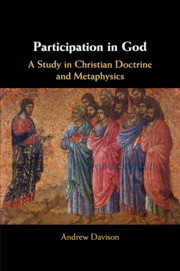Book contents
- Participation in God
- Participation in God
- Copyright page
- Dedication
- Epigraph
- Contents
- Acknowledgements
- Works of Thomas Aquinas: Texts, Translations, and Abbreviations
- Introduction
- I Participation and Causation
- II The Language of Participation and Language as Participation
- III Participation and the Theological Story
- 8 Participation and Christology
- 9 Participation and Creaturely Action
- 10 Evil as the Failure of Participation
- 11 Redemption I
- 12 Redemption II
- IV Participation and the Shape of Human Life
- Conclusion
- Bibliography
- Index of Names
- Subject Index
- Index of Biblical References
- Index of Works of Aquinas
11 - Redemption I
Restoration and Union
from III - Participation and the Theological Story
Published online by Cambridge University Press: 15 August 2019
- Participation in God
- Participation in God
- Copyright page
- Dedication
- Epigraph
- Contents
- Acknowledgements
- Works of Thomas Aquinas: Texts, Translations, and Abbreviations
- Introduction
- I Participation and Causation
- II The Language of Participation and Language as Participation
- III Participation and the Theological Story
- 8 Participation and Christology
- 9 Participation and Creaturely Action
- 10 Evil as the Failure of Participation
- 11 Redemption I
- 12 Redemption II
- IV Participation and the Shape of Human Life
- Conclusion
- Bibliography
- Index of Names
- Subject Index
- Index of Biblical References
- Index of Works of Aquinas
Summary
Theological discussions of participation have typically been worked out either in relation to the doctrine of creation – how the created order receives what it is by a sharing from God – or in the realm of soteriology (or the doctrine of salvation). We turn here to that second area of doctrine in this chapter and the next. We see that notions of participation are integral, and foregrounded, in certain approaches to redemption, especially those belonging to what is often called the 'ontological' approach, which places an emphasis on God's sharing of humanity in Christ as itself redemptive, and which typically talks about our sharing in divinity as the consequence. The connection of these ideas to Paul's notion of being 'in Christ' is explored, alongside other, parallel, Biblical themes. Other accounts of redemption are also shownto have a strong participatory basis, including substitutionary accounts, at least where what God shares with humanity in Christ – namely, our humanity – has been thought to be integral for why such a substitution can be said to have occurred.
Keywords
- Type
- Chapter
- Information
- Participation in GodA Study in Christian Doctrine and Metaphysics, pp. 260 - 279Publisher: Cambridge University PressPrint publication year: 2019

